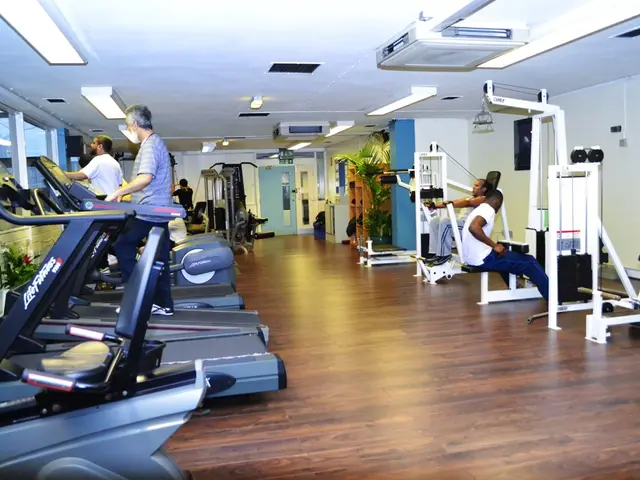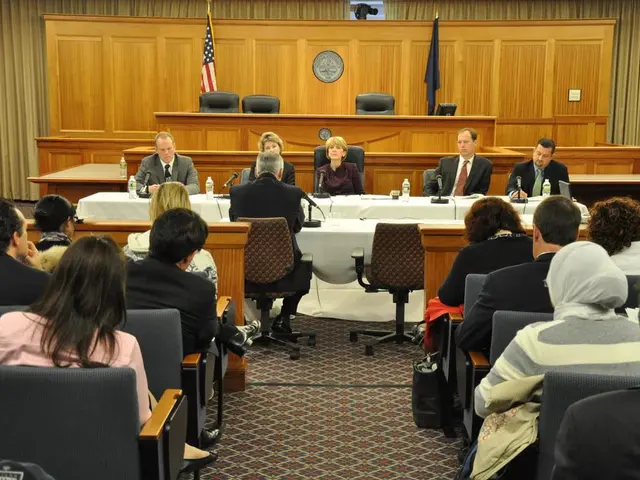Keep That Brain Sharp: Visit the Gym, Just 5 Minutes a Day!
Brain Health Through Exercise: Could Just Five Minutes Make a Difference in Aging
As we age, changes in our brains can lead to cognitive issues, like memory problems. But worry not! There's a simple way to help keep your grey matter in tip-top shape: regular exercise!
You guessed it - it could be as quick as a 5-minute, sweat-inducing workout!
Research has shown that older adults who engage in moderate-to-vigorous physical activity daily - think jogging, brisk walking, or a dance class - experience better processing speed, working memory, and executive function (read: brain's problem-solving skills) compared to those who don't commit to becoming active. 1
Here's the interesting bit: The research, led by Audrey M. Collins, PhD, found that even teeny 5-minute bouts of moderate-to-vigorous activity provide these cognitive benefits! 1
Don't have time to spare? That's fine! The more hours you log in a day as a sweaty, moving machine, the better. The study suggests that the cognitive gains are more significant in individuals who dedicate more of their day to exercise. But even a small shift, like going from nothing to 5 minutes a day, improves cognitive function. 1
So, are you ready to shrug off those aging blues and put some pep in your step? Get out there, and take a walk, run, or dance! Your brain will thank you!
Brain health: Lifestyle factors all closely linked
A recent study by Collins and her team, published in the journal Age and Ageing, demonstrates that the way we spend our 24 hours matters for cognitive function in older adults. 1
Analyzing data collected from 585 participants aged between 65 and 80 who took part in the U.S.-based IGNITE study, the researchers examined the relationship between a person's activities over a 24-hour period, including sleeping, sedentary time, light physical activity, and moderate-to-vigorous physical activity, and cognitive performance.
Just 5 minutes of exercise offers brain benefits
Most fascinatingly, the researchers found that the cognitive gains were seen when individuals went from doing no moderate-to-vigorous physical activity to completing a minimum of 5 minutes a day.
"Our results suggest that hypothetically reallocating time to moderate-to-vigorous physical activity may be beneficial for cognitive function, regardless of what lifestyle behavior this time was reallocated from," Collins explained. "Further, even small increases of moderate-to-vigorous physical activity may be favorable."
Fine print
- Collins, Audrey M. et al. "Association between total activity energy expenditure and cognition in older adults: a cross-sectional study using accelerometry-based 24-h estimates." Age and Ageing, 2022. DOI: 10.1093/ageing/afac239
Return to Table of Contents
- As we age, changes in neurology can lead to cognitive issues such as memory problems, but a simple solution exists: regular exercise.
- Seniors who engage in moderate-to-vigorous physical activity daily can experience better cognitive function, including improved processing speed, working memory, and executive function.
- A recent study led by Audrey M. Collins, PhD, found that even brief 5-minute bouts of moderate-to-vigorous activity offer significant cognitive benefits, regardless of the type of exercise.
- The study suggests that individuals who dedicate more time to physical activity each day will see greater cognitive gains, but even a small increase from doing no exercise to 5 minutes a day improves cognitive function.
- Lifestyle factors, including sleeping patterns, sedentary time, light physical activity, and moderate-to-vigorous physical activity, are closely linked to brain health in older adults.
- The scientist's research found that reallocating time to engage in moderate-to-vigorous physical activity may be beneficial for cognitive function, no matter what other lifestyle behaviors are altered.
- General health, obesity, and fitness-and-exercise are essential factors in preventing aging-related cognitive decline and promoting health-and-wellness in seniors.
- It is essential to evaluate and permit continued research in the field of agingandlongevity, science, and neurotransmitters to better understand the impact of lifestyle choices on brain health as we age.








